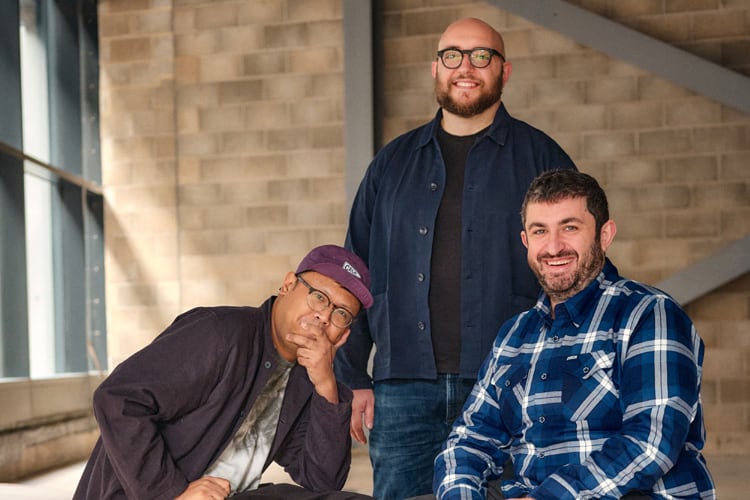There are certainly some major differences to be spotted when stepping into Singburi’s shiny new digs within the Montacute Yards development in London’s Shoreditch. Fans of the original Leytonstone restaurant, which held its last service in November last year having grown into a culinary cult classic, will immediately note that that the famed blackboard of specials is now in the window rather than overlooking the dining room, while the old school wooden tables are gone altogether. BYOB remains an option, but corkage is now charged. And while cash was once king, the new site only takes card payments.
The kitchen is another noticeable point of difference. Sequestered at the back in the old site, here it is a fiery open space in the centre of the restaurant that comes complete with custom grill and counter seating. The design, meanwhile, which has been created in partnership with celebrated Bangkok studio Physicalist, eschews the homely quality of the original in favour of a brighter, contemporary style with floor-to-ceiling windows, industrial accents, and terrazzo flooring.
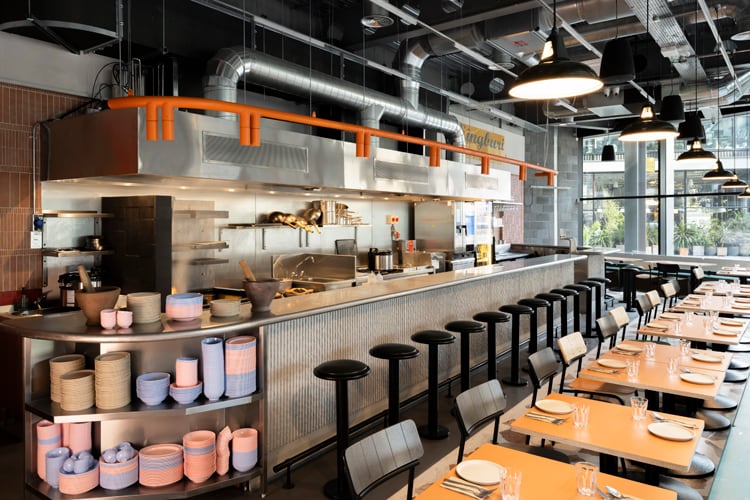
Those reading this with a sinking feeling that Singburi 2.0, as it has been dubbed, is going to be too much of a departure from its original iteration, however, have little to fear. As the original bright yellow signage, now nailed above the bar area, and the rambutan-adorned ‘Bushy, juicy’ Thai tourism poster on the wall shows, Singburi Shoreditch is, at its heart, the same restaurant it always was. The cooking remains a bracingly authentic exploration of adventurous Thai dishes; prices continue to be strikingly affordable; and, based on initial demand at least, getting a reservation is every bit the challenge it always was.
‘Same but different’
Behind the scenes there have been some changes too. Chef-patron Sirichai ‘Siri’ Kularbwong remains a central cog, but he’s no longer flanked by his parents, Tony and Thelma, who originally established the Leytonstone restaurant as a fish and chip shop back in 1999. Singburi’s evolution to a Thai canteen came about after Kularbwong took over the running of the restaurant and began cooking alongside his mum and dad; a move that saw its popularity skyrocket to the point that it became renowned as one of the capital’s most popular restaurants, and went on to be ranked as one of the best in the country – featuring twice on the National Restaurant Awards Top 100 list.
The decision to close the original Singburi came about as a result of Tony and Thelma choosing to retire after 25 years at the pass. “I went through a lot of emotions saying goodbye to that place,” says Kularbwong, reflecting on the closure. “But it was a mutual decision. We knew we’d gone as far as we wanted to.”
As its relocation to Shoreditch demonstrates, though, this wasn’t to be the end of the Singburi story. Enter Nick Molyviatis and Alexander Gkikas, fellow hospitality professionals and friends of Kularbwong, who convinced him to join forces with them. “It all aligned for us,” explains Molyviatis, who is best-known for his stint running the kitchen at highly rated Soho Thai restaurant Kiln. “Alex and I had chatted about doing a Thai restaurant. And it felt like this opportunity was in front of us.”
I’d always thought about what I’d do if I had an opportunity to move the restaurant forward
Sirichai Kularbwong
The pair, who had been regulars at Singburi for years, knew of Kularbwong’s plans to close the restaurant in early 2024, and so they approached him with a plan to relocate and relaunch it as an evolved concept that they would run as a partnership between the three of them.
“At the time I was caught at this crossroads of having a good problem,” says Kularbwong, picking up the story. “Leytonstone was so busy, and I loved it; but I was also thinking about wanting something quieter, like stacking shelves in HMV.”
Molyviatis’ proposition piqued his interest though. “I’d always thought about what I’d do if I had an opportunity to move the restaurant forward like that,” he adds. “Plus, I’d known him and Alex for a long time, and knew their skills and expertise were fucking amazing. And so, I had a think to myself and thought, ‘why not go for it?’”
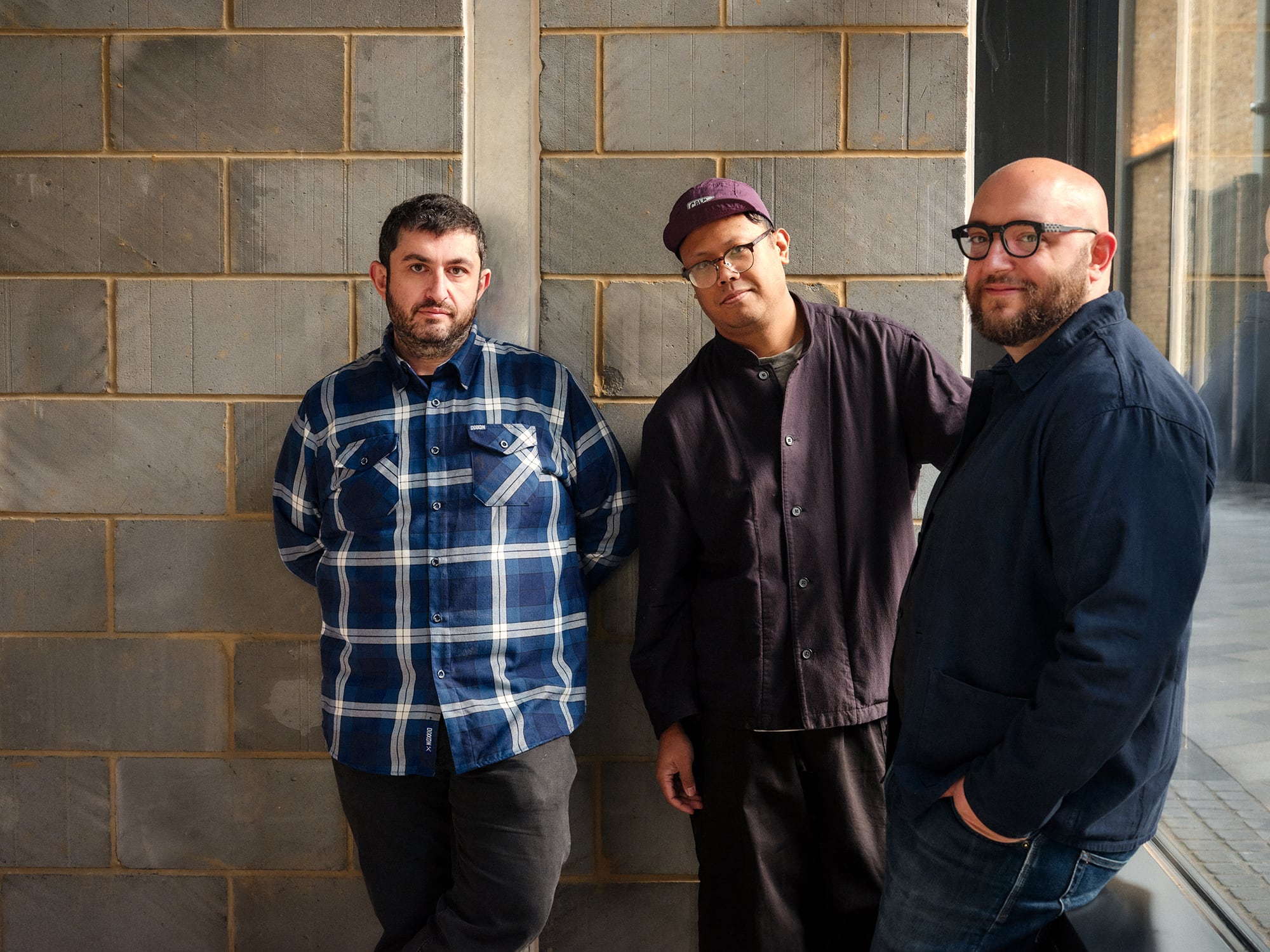
“Maybe the biggest difference is that the original was family owned, but this is friend owned,” adds in Gkikas. “Siri used to have his mum and dad bossing him about in the restaurant; now he has us doing it.”
‘Same but different’ is how the trio describe their creative vision for Singburi 2.0. “It sounds very generic, but it speaks to what we wanted to achieve,” Molyviatis says. “It winks at the old place but is looking forward and moving in a new direction.
“The main thing for us is to do right by the name.”
Singburi 2.0
We’re sat in the Singburi 2.0 site just a few days out from its first service. From the kitchen comes the hum of the extraction fans, which were connected earlier in the afternoon; outside, a workman is putting up a yellow sign with ‘Thai food’ written in block green capitals – another nod to the Leytonstone restaurant’s exterior signage.
Kularbwong, Molyviatis and Gkikas are all aware that many will judge the success of Singburi 2.0 on how well it mirrors the original. “The comparisons are always going to be there,” says Molyviatis. “But even if we brought the original restaurant here brick by brick, there would still be people saying that it’s not the same and that it used to be better.”
The idea for the venture, though, was predicated on Singburi 2.0 establishing itself as something new, moulded in the image of its three founders. “We’re not the first to do this, even in the Shoreditch area,” Molyviatis continues. “Manteca had two iterations before it came here. Smoking Goat had one in Soho.
“I’m not saying the first Singburi will be forgotten; we have the sign and the posters, but we wanted to do it our way.”
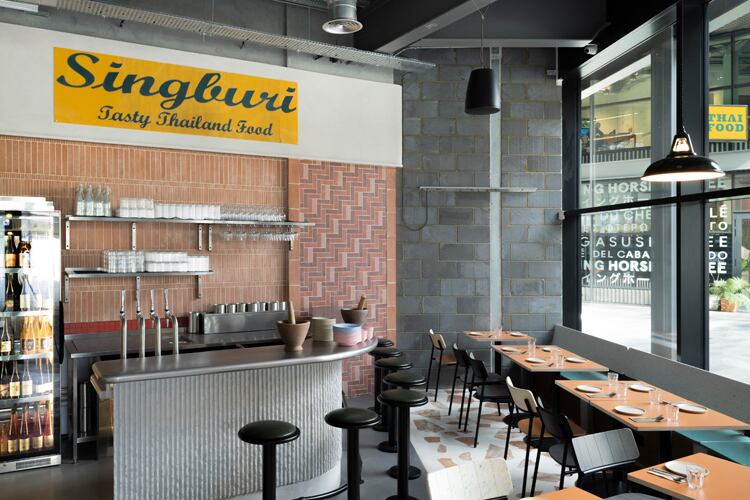
Perhaps one of the key changes between the original Singburi and the Shoreditch restaurant is the introduction of a drinks menu. “One of the key elements missing from the previous site was the booze,” says Gkikas, who is also behind Catalyst, a café and coffee shop close to Chancery Lane. “With this new space, we wanted to show how spice can pair with and elevate wine.”
Working with Guillame Aubert, founder of Ancestral Wines bar and bottle shop in Forest Hill, Gkikas has put together a rotating selection of predominately natural and low intervention wines that are all available to order by the glass. Around 14 bins are available, drawing from across the world and ranging from bright and clean to textural and wild.
Alongside this, a cocktail list has been created in partnership with Vassilios Kyritsis, founder of Athens-based bars The Clumsies and Line, which are both currently ranked on The World’s 50 Best Bars list. Options include a clarified Bloody Mary; makrut lime leaf Gimlet; and a non-alcoholic Old Fashioned.
“We’re all doing things that we couldn’t do before,” adds Gkikas. “I had a coffee shop, but not a restaurant space; Siri had a restaurant, but he couldn’t serve alcohol; and Nick wanted a project he could lead.”
My biggest fear when designing [the counter] was to be compared to Kiln. But then I was reminded that I was part of that restaurant when it launched, and that being compared to something so great is a positive
Nick Molyviatis
The decision to take on the site in Shoreditch was an easy one; the open space giving them the option to create an open kitchen with counter – a visible reflection of Molyviatis’s tenure at Kiln. “My biggest fear when designing [the counter] was to be compared to Kiln,” he says, frankly. “But then I was reminded that I was part of that restaurant when it launched, and that being compared to something so great is a positive.”
Moving the restaurant to a more central location – it’s close to both Shoreditch High Street and Old Street station – also means Singburi 2.0 will be more accessible than the original was. Does that put further pressure on its founders? “Yes,” replies Kularbwong, immediately. “That’s the fun part. It’s a challenge. We have the existing, loyal guest base, and now we’re in Shoreditch there’ll be a whole new group of guests who will want to come; some of whom may have wanted to come before but weren’t able to get a booking.
“Our focus is equally on trying to please those that have been longtime regulars and those coming for the first time. We were open for 25 years in Leytonstone, so those people really mean a lot to me. They’ve supported us and we have emotional ties with them. To up sticks and totally disregard that would be irresponsible. But part of the joy of this new restaurant is carrying those bonds over, while also building new ones.”
A diverse cuisine
While the menu remains structurally similar, with an emphasis on sharing dishes served in a casual environment, Kularbwong, Molyviatis and Gkikas have put a lot of energy into making the menu at Singburi 2.0 distinct from what’s come before. For example, the fixed à la carte menu of staple Thai dishes – think massaman curry and pad Thai noodles – has been ditched, with the decision to focus in on the blackboard of specials that helped define the original concept.
The new menu features a tight selection of dishes that will change up to twice a day, depending on access to produce. Significantly, none of the dishes that were mainstays of the Leytonstone blackboard – the crispy pork moo krob, and the clams with roast chilli jam and basil – have been carried over, with Molyviatis and Kularbwong developing a set of new but stylistically similar dishes.
Much of the Singburi 2.0 menu has been designed to make use of the new grill and smoker, which is central to the theatre of the open kitchen, with the two chefs describing themselves as being guided by both seasonality and their instincts for the cuisine. As Molyviatis puts it: “At its heart, the menu is an evolution of the Singburi blackboard, and a reflection of what we love to eat and cook.”
Signature options to feature on the Shoreditch launch menu include a dill and lemongrass pork sausage; wild ginger chicken thigh; prawn and betel leaf curry; mussels with tomato and sweet basil; and smoked pork belly and green peppercorn. Just like the original restaurant, though, there are no desserts. Prices, meanwhile, are approachable, with many of the dishes pitched at under the £10 mark.
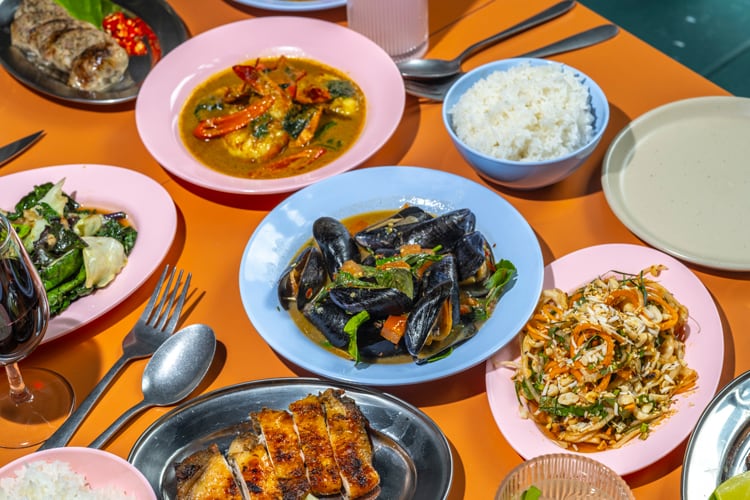
As part of the food development, Kularbwong, Molyviatis and Gkikas all spent time in Bangkok, and many of dishes are inspired by the city’s culinary melting pot of regional influences from across Thailand. “It’s emblematic of what we see a lot in the new wave of Thai restaurants in London,” says Molyviatis, referencing not just the likes of Kiln and Smoking Goat, but also Plaza Khao Gaeng and Som Saa.
“What’s great about the food out there is that there’s no rules,” adds Gkikas. “It’s not all about spice; dishes are very balanced and approachable, and we want to capture something of that.”
Molyviatis is aware that some may question the authenticity of Singburi 2.0, given that two of its founders are of Greek origin, but believes that his past credentials, coupled with Kularbwong’s involvement, speaks for itself. “One of the reasons I left Kiln is because I felt I was holding the restaurant back,” he says. “All my knowledge came from books and learning, which is limited. But between myself and Siri we have a balance, and we’re making something new.
“For us, our only critics are Siri’s parents and ourselves, and we believe in the food we serve.”
We’re hoping to make the Singburi name proud. We want Siri’s mum and dad come and say it’s better than before
Nick Molyviatis
“Singburi was just a family run restaurant, it wasn’t driven by a strive for authenticity,” adds Kularbwong. “My dad was from Sing Buri, and he spent a lot of time in Bangkok. He also travelled across the country laying power lines and trying good restaurants from different regions; and his cooking reflected that.
“Thai cuisine is very diverse. There’s such a wide selection of dishes and flavours to choose from, and here we’re just trying to find a way through it.”
The personal touch
Both Molyviatis and Gkikas point to Kularbwong as an inspiration to them and a key reason why the original Singburi was such a favourite among London’s foodie community. “The food was so tasty,” says Gkikas. “It spoke to the heart, and it’s an experience that couldn’t be replicated.”
For Kularbwong himself, that restaurant’s success spoke to something personal that resonated with diners. “It’s the whole thing. These days you don’t see many restaurants run by families. It wasn’t a faceless chain or run by a huge corporation, it was run by people and there’s a connection to that.”
London is one of the best places for food right now. What’s missing in a lot of them, though, is hospitality
Alexander Gkikas
He gestures towards the new counter before continuing: “It’s why we have the open kitchen. People can grab a seat and be served by the chefs and strike up a conversation. That’s the point of it. I think we forget that a lot. It was always a genuine interaction and we’re carrying that forward. A good restaurant is not justified by its food; it’s the whole experience.”
To that end, Singburi 2.0’s three founders have spent a lot of time working to offer a robust employment offer that promotes staff welfare. This includes giving each member of the team three days off a week.
“London is one of the best places for food right now,” says Gkikas. “What’s missing in a lot of them, though, is hospitality. And if there’s nobody smiling it takes away from the experience. That’s why we’re working hard on supporting them and setting an example that we want our staff to follow.”
“If you keep the staff happy, they will keep the diners happy; and they will come back and tell other people to come,” adds Molyviatis. “We’re hoping to make the Singburi name proud. We want Siri’s mum and dad come and say it’s better than before.”
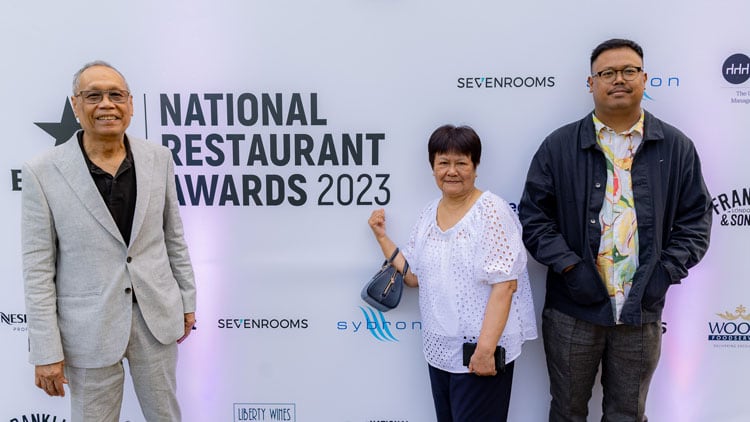
As for Tony and Thelma, they’re enjoying their retirement and excited to see Singburi thrive in its new iteration. “They’re spending their days at home relaxing and watching shows on Youtube,” says Kularbwong, with a warm smile. “My dad used to cook pork belly, and my mum would make spring rolls for 60 people a night. They enjoyed it, but it was hard demanding work.
“Now they’re loving life doing nothing. And they deserve it.”


